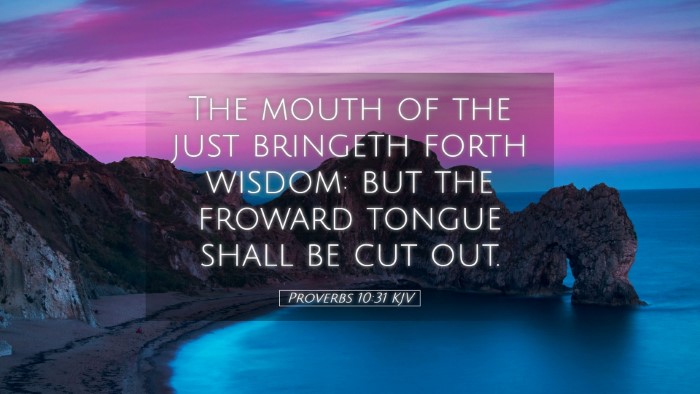Commentary on Proverbs 10:31
Proverbs 10:31 states, "The mouth of the just bringeth forth wisdom: but the froward tongue shall be cut out." This verse offers profound insights into the weight of words, divine justice, and the moral fabric of society, and these themes have been dissected through various public domain commentaries. Below is an amalgamation of insights from notable figures such as Matthew Henry, Albert Barnes, and Adam Clarke.
Introduction to the Verse
This proverb presents a dichotomy between the righteous and the wicked, specifically focusing on their respective speech. The verse emphasizes the significance of morality reflected in one's words and illustrates the consequences derived from one's speech.
Insights from Matthew Henry
According to Matthew Henry, the verse encapsulates the essence of righteousness manifested through speech. He posits that the 'mouth of the just' symbolizes a source of wisdom that brings forth beneficial counsel and teaches righteousness. Henry emphasizes that just individuals possess an innate ability to articulate wisdom, which is a gift from God.
- Righteous Speech: Henry notes that wisdom derived from a righteous heart is essential for constructive discourse in both personal and communal matters.
- The Fate of the Wicked: He illuminates the latter portion of the verse, which warns that the 'froward tongue' - symbolizing deceitful and morally corrupt speech - will face dire consequences. Henry implies that divine retribution awaits those who misuse their speech for malevolent ends.
Insights from Albert Barnes
Albert Barnes offers an analytical perspective on Proverbs 10:31, emphasizing the dual outcomes of righteous and wrongful speech. He draws from the Hebrew text to elucidate the meanings behind the terms used in the verse.
- Wisdom of the Just: Barnes emphasizes that the wisdom spoken by the just arises from their integrity and understanding of God's commands. This wisdom serves as guidance not just for the speaker but also for the community at large.
- The Cutting Out of the Froward Tongue: Barnes highlights the severity of the consequence faced by those who engage in wicked speech. He interprets 'cut out' as a form of divine judgment, representing either the spiritual or literal removal from society or the grave loss of credibility and respect.
Insights from Adam Clarke
Adam Clarke provides a theological reflection on this verse, focusing on the spiritual implications of speech and its errant use. He details the ways in which words can reflect one’s inner moral condition.
- The Righteous as Communicators of Wisdom: Clarke affirms that the mouth of the just not only speaks wisdom but also embodies it. He connects their speech with the knowledge of God’s law, suggesting that true wisdom springs from a God-focused life.
- Judgment on the Froward: He reiterates the judgment outlined in the second part of the verse and elaborates that the 'froward tongue' represents a life lived in opposition to God’s will, leading to inevitable destruction.
Thematic Implications
Both the righteous and the wicked are portrayed as having verbal influence. The ability of the just to produce wisdom translates into ethical and moral benefits for society, while the words of the wicked incur judgment and decay.
- Importance of Discernment: The necessity of discernment in speech is underscored. Righteous speech leads to wisdom that edifies, while wicked speech can corrode both interpersonal relationships and spiritual integrity.
- Impact on Community: The verse conveys the philosophical idea that individuals' words contribute to the growth or decline of the community and the importance of upholding moral standards in communication.
Practical Application
For pastors, students, theologians, and Bible scholars, Proverbs 10:31 serves as a vital reminder of the responsibility that accompanies speech:
- Leading By Example: Leaders and educators should strive to exemplify the wisdom of just speech, fostering an environment where wisdom thrives.
- Encouraging Discernment: Encouragement of discernment in speech among congregants and peers to mitigate the influence of froward speech within communities.
- The Role of Accountability: Establishing accountability for words spoken, challenging the individuals to adhere to the standard highlighted in this proverb.
Conclusion
Proverbs 10:31 articulates a timeless truth about the profound effect of speech and the moral undertones woven within it. The collective insights from Matthew Henry, Albert Barnes, and Adam Clarke culminate in a rich understanding of this verse, providing critical reflections on the correlation between righteousness, wisdom, and the repercussions of froward speech. Engaging with this text encourages individuals to pursue wisdom diligently, tethering their words to their moral and spiritual convictions.


